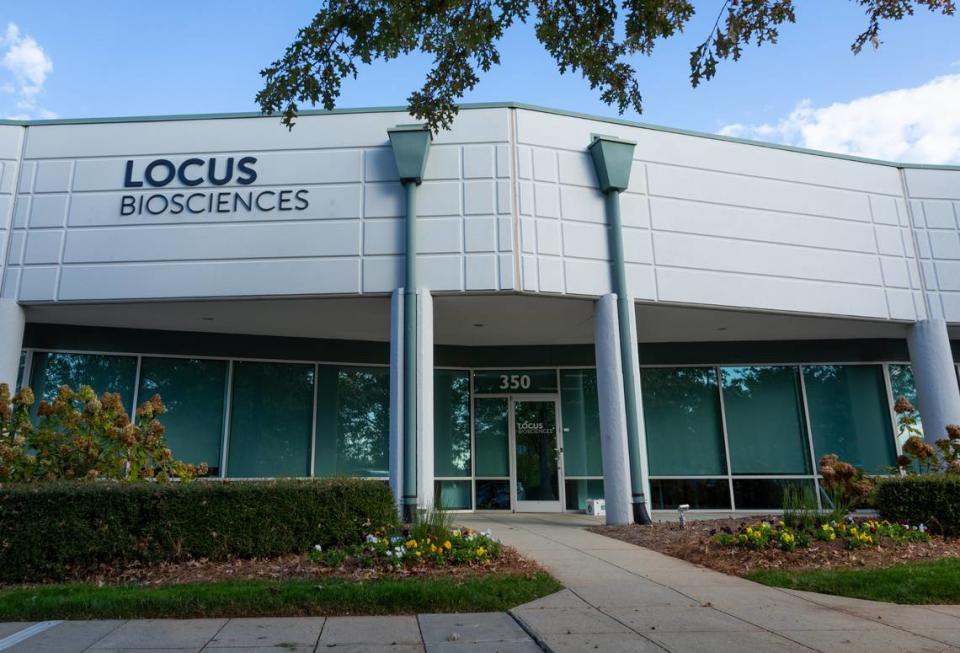RTP’s Locus Biosciences grows as it tackles issue of drug-resistant bacteria
Locus Biosciences is expecting more growth in 2022, as the gene-editing company strives to provide alternatives to the pressing issue of drug-resistant bacteria.
Fresh off positive Phase 1 clinical trial results for its drug targeting E. coli bacteria and a $25 million financing deal last year, Locus has expansion on its mind and will be launching an important phase 2 trial.
Locus, founded in 2015 by N.C. State University professors, is based in Research Triangle Park. It uses CRISPR gene-editing technology to create what are called bacteriophage therapies.
Bateriophages, also known simply as phages, are viruses that can attack and neutralize bacteria. Locus’ first phage to go through clinical trials is targeting E. coli bacteria in urinary tract infections, one of the most common infections on the planet and sometimes called the “canary in the coal mine” of drug resistance.
The biotech company said last year that its phase 1 trial, which is meant to determine the safety of experimental drugs and therapies, was safe and well tolerated. It also reported that its phage decreased the level of susceptible bacteria in patients infected with E. coli in the bladder.

Paul Garofolo, Locus’ CEO, said his company wants to begin registering up to 780 patients in its phase 2 trial by the middle of the year, a patient population that is larger than a usual phase 2 study.
“We’re focusing ... on women who get recurrent urinary tract infections multiple times a year,” he said in a video interview. “There are patients that are going to urology specialists and OB-GYNs to try to deal with these infections.”
Garofolo said Locus hopes to get a full readout on the trial’s results by 2024, though it hopes to have some preliminary data available before then.
Millions in revenue with no drugs approved
Regulators haven’t approved any of the company’s drugs, but Locus already has successfully booked millions in revenue, thanks to partnerships with the Biomedical Advanced Research and Development Authority (BARDA), Johnson & Johnson and other organizations.
Last year, the company brought in $31 million in revenue, Garofolo said.
“We have roughly a billion dollars of contracts from BARDA, CARB-X, Johnson & Johnson and a second strategic that’s not publicly announced,” Garofolo said.
Companies and government partners, like BARDA, are interested in Locus because of the ominous rise of drug-resistant bacteria. A recent study in the medical journal The Lancet, for example, found there were nearly 5 million deaths in 2019 globally associated with drug-resistant infections — a number that is expected to grow in the coming years.
Locus finished last year with around 80 employees at its 25,000-square-foot, research-and-manufacturing facility off Davis Drive. Garofolo expects to hire another 20 to 30 this year, and he said the company is contemplating expanding its footprint here.
“We’re kind of running out of space,” he said.

Move into other therapies
The company’s next path for growth could be in immunology and making gene-edited phage treatments that target specific parts of the immune system.
Garofolo said Locus already has signed an agreement with a “top-five pharma partner” to do research on whether its phage technology could be applicable on diseases such as ulcerative colitis, which causes sores and inflammation in the digestive tract.
“I think the next great horizon for phage technologies is to really move full force into immunology,” he said. “You’re beginning to see all kinds of academic research that’s beginning to link bacteria in your body to things like the gut-brain axis ... and bacterial links in all kinds of gut disorders typically related to immune system malfunctions.”
Tackling bacteria affecting the immune system is a more difficult task than something like a UTI infection, Garofolo said. With a UTI infection, there is likely only one bacteria present that its phages need to attack.
“When you go after something like ulcerative colitis, it’s a constellation of bacteria. It’s not one,” he said. “You have to really know what you’re targeting to take that bacteria out.”
“We’ve been building some prototype (treatments), and running them through some animal models,” he added, “and they’re beginning to see some fantastic results.”
This story was produced with financial support from a coalition of partners led by Innovate Raleigh as part of an independent journalism fellowship program. The N&O maintains full editorial control of the work. Learn more; go to bit.ly/newsinnovate

